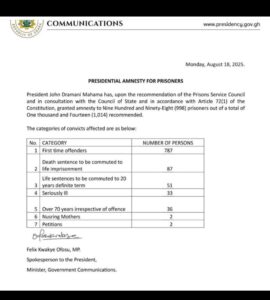In a significant move to promote rehabilitation and reintegration, President John Dramani Mahama has granted amnesty to 998 prisoners out of a total of 1,014 recommended by the Prisons Service Council. The decision, made in consultation with the Council of State and in accordance with Article 72(1) of the Constitution, aims to provide a second chance to individuals who have demonstrated good behavior and a willingness to reform.
Categories of Prisoners Affected
The amnesty affects various categories of prisoners, including:
– First-time offenders: 787 individuals who have committed minor crimes and are serving their first sentence.
– Death sentence commuted to life imprisonment: 87 prisoners who have been sentenced to death but will now serve life imprisonment instead.
– Life sentences commuted to 20 years: 51 prisoners who have been serving life sentences but will now be eligible for parole after 20 years.
– Seriously ill: 33 prisoners who are suffering from serious illnesses and require medical attention.
– Over 70 years old: 36 prisoners who are over 70 years old and are no longer considered a threat to society.
– Nursing mothers: 2 prisoners who are nursing mothers and require special care.
– Petitions: 2 prisoners who have submitted petitions for clemency and have been granted amnesty.
Significance of the Amnesty
The presidential amnesty is a significant step towards promoting rehabilitation and reintegration in Ghana’s correctional system. By providing a second chance to individuals who have demonstrated good behavior, the government aims to reduce recidivism rates and promote social cohesion.
Quotes from Officials
“The President’s decision to grant amnesty to these prisoners is a testament to his commitment to promoting rehabilitation and reintegration in our correctional system,” said Felix Kwakye Ofosu, Spokesperson to the President and Minister of Government Communications.
 Implications for Ghana’s Correctional System
Implications for Ghana’s Correctional System
The amnesty is expected to have a positive impact on Ghana’s correctional system, reducing overcrowding and promoting a more rehabilitative approach to justice. As the country moves forward, it is essential to continue evaluating and improving the correctional system to ensure that it serves the needs of both prisoners and society.